CONTENTS

Stress is something that plagues all of us from time to time. It can make us irritable, make it difficult to sleep at night, and even intrude into our relaxing thoughts and activities. There’s no way to completely get rid of stress. However, there are effective ways to manage it, minimize its impact, and effectively relax so that we can go about our lives refreshed and energized.
In this article, we will take a look at what causes stress, the long term ramifications of high levels of stress, and preventative measures and stress management for any lifestyle using a personalized stress management routine.
What is Stress?

The term ‘stress’ was originally coined by Hans Selye in 1936. Selye observed that animals could develop physical diseases from experiencing long term acute stress. Since it covers both psychological and physiological symptoms, stress has taken on a wide meaning to accommodate most negative experiences stemming from a limitation of personal resources.
Stress is the body’s natural reaction to changes and how we react to them. This means that when we encounter a change in our lives that requires us to adjust what we’re doing, we feel symptoms of stress.
Additionally, stress can be identified as an imbalance between the demands that are made on us and the resources that we have to satisfy these demands, causing us to feel overwhelmed. In this case, someone might feel stress if they feel they have to do something that they are afraid they will fail at.
It’s natural and unavoidable to experience and react to stress. We can manifest these reactions physically, emotionally, and mentally. While stress is normal, we are all different when it comes to what exactly causes us stress. Something that stresses you out may not bother your partner and vice versa.
Sometimes these reactions are positive which sharpens our mental acuity, alertness, and physical performance. This is because stress releases adrenaline that helps us to avoid dangers.

However, stress can quickly become a problem when an individual experiences continuous stress without outlets for relief and relaxation.
Some Misconceptions About Stress
- Stress Comes from Certain Circumstances – We might say, “this is a stressful situation.” However, situations or circumstances are not inherently stressful. Instead, stress is more based on the thoughts we have about these situations and how we react to them.
- Breathing Techniques and Stress Management Can Eliminate Stress – Eliminate is the key word in this case. Stress management techniques help us cope with symptoms of stress, and decrease the effect of the stress hormone in our body.
However, since stress comes from our thoughts about a change or situation, the only way to change our stress reactions is to think long-term in a different way about the source of the stress. Both stress management and thinking differently about a challenging situation will help us limit the amount of stress in our lives.
- We Need to Eliminate All Sources of Stress from Our Lifestyle – We commonly have things that we enjoy doing that also cause us stress.
For example, travel anxiety frequently affects those who enjoy traveling. Rather than eliminating sources of stress that we might otherwise want in our lives, we can make those things less stressful by changing the things we believe about them and the way that we think when we approach them.
We do not need to limit our lives to appease stress. Instead, we need to learn methods that allow us to examine stress and learn new ways of thinking about it that do not trigger fear or anxiety.
What Causes Stress?
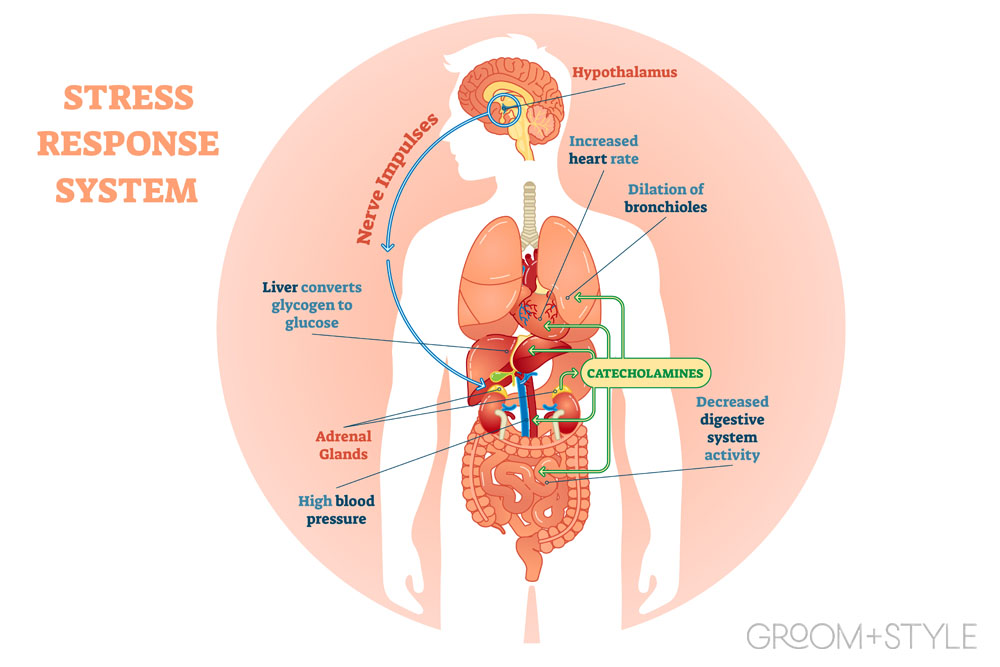
Stress is a physical and psychological process where the body releases hormones in order to protect itself from danger. Even though we might not always be in physical danger, sources of stress tend to be everywhere.
They can come from our environment, our own body, our relationships, and our own thoughts. Stress isn’t always caused by negative situations, either. Stress can also come from positive events, such as a work promotion, wedding plans, moving to a new place, or having a child.
When we are stressed, the base of the brain (the hypothalamus) reacts by sending signals to the adrenal glands. These signals cause the adrenal glands to release hormones, including adrenaline and cortisol. The hormones can cause alertness, as well as tense muscles and an increased pulse.
The Effect of Being Constantly Busy on Stress Levels

It can be difficult to find the time to relax in our productive routines. We often have complicated goals in and out of work that cause us to strive for productivity with everything we do. Any downtime can feel like a waste of time.
However, taking some downtime to relax and destress is completely necessary. Handling too much stress can cause us to become overworked while building up tension. This buildup can cause the body to experience physiological changes, including physical and emotional wear and tear on the body.
Long-term stress without relief can lead to distress, which disturbs the body’s internal balance and equilibrium. Under distress, it’s common to experience physical symptoms, including:
- Headaches
- Muscular aches and pains
- An upset or uneasy stomach
- High blood pressure
- Chest pains
- Sexual dysfunction
- Difficulty sleeping
Common emotional symptoms of distress include:
- Forgetfulness, as well as a lack of energy or focus
- Depression
- Anxiety
- Panic attacks
In addition to increasing the severity of viral infections, chronic stress is liable to worsen certain diseases. These include each of the six leading causes of death:
- Heart disease
- Cancer
- Lung ailments
- Accidents
- Cirrhosis
- Suicide
Long-term stress has also been known to contribute to the compulsive use of drugs, substances, and other relief-seeking behaviors that stimulate dopamine, including:
- Overeating
- Excessive alcohol consumption
- Smoking tobacco
- Drugs and painkillers
- Gambling
- Compulsive sexual activity
- Impulsive shopping
- Technological addictions
Behaviors such as these, are less likely to relieve stress or put the body into a relaxed state. Instead, they are more likely to cause additional problems and further sources of stress.
Is Stress Always Bad For You?
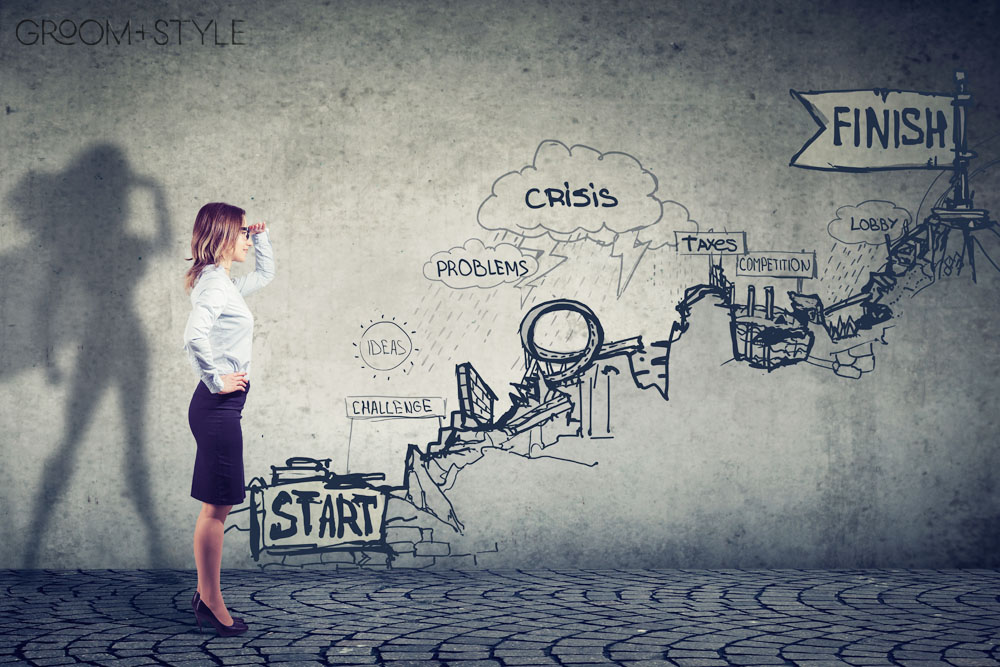
We’ve talked at length about the health complications that stem from stress. However, there are certain situations when stress reactions can actually help you. Stress reactions are part of our body survival defense against dangers, and they trigger the ‘fight or flight’ instinct. This can be important in situations where we need to be more sensitive to dangers and more aware of our surroundings.
The Positive Effects
On this positive side, stress activates your body’s fight or flight response, which keeps you alert, motivated, and ready to avoid potential dangers. It gives you the boost you need to overcome the challenge or change that caused the stress.
In daily life, stress can stimulate people to prepare and perform well for testing, presentations, or interviews. If physical survival is on the line, the adrenaline triggered by stress can save your life. Nonetheless, stress is not a motivator, and if experienced long term due to a certain circumstance, is more likely to hinder productivity than promote it.
Medical Forms of Stress

Acute
Acute stress refers to short-term high-intensity instances of stress. Since this is a normal effect of how our bodies react to challenging events, everyone is bound to experience it at least once in their life. Acute stress will normally go away quickly after the event that caused the stress.
This kind of stress helps you to react to and manage difficult or dangerous situations. Some sources of acute stress include giving a presentation, having a fight with a partner, doing something new, going on a potentially dangerous adventure or activity, or even reacting to traffic while driving.
Episodic Acute Stress
Episodic acute stress refers to experiencing frequent episodes of acute stress. This will often come from being anxious or feeling worried about something that you expect to happen. It is common among people who feel that their life jumps from one crisis to another. Episodic acute stress is also common among professionals who are subject to frequent though varied high-stress situations, such as law enforcement.
Chronic
Chronic stress refers to stress that lasts for a long period of time. It is usually caused by long-term stressors in an individual’s lifestyle or relationships. Stress that goes on for weeks to months at a time is considered chronic stress.
Chronic stress comes from experiencing instability in our lives so that we can’t become comfortable in certain situations. Common sources of chronic stress include money problems, work instability, inconsistent workplace management, or a rocky relationship.
Those who suffer from chronic stress may become so used to living in that state that they don’t notice it’s a problem. Chronic stress causes your body to remain alert, even when there is no danger. Additionally, it’s the form of stress most likely to lead to long-term complications.
Traumatic or Severe Acute Stress
Individuals experience traumatic stress or acute stress disorder (ASD) from major negative events, such as an accidents, war, assault, or natural disasters. The individual may have been in danger or seriously injured, and they may have seen others around them hurt or killed. Symptoms of traumatic stress can be similar to temporary symptoms of mental illness. Recovery often takes time and may require counseling and therapy. Severe acute stress can lead to post-traumatic stress disorder (PTSD).
Types of Stress
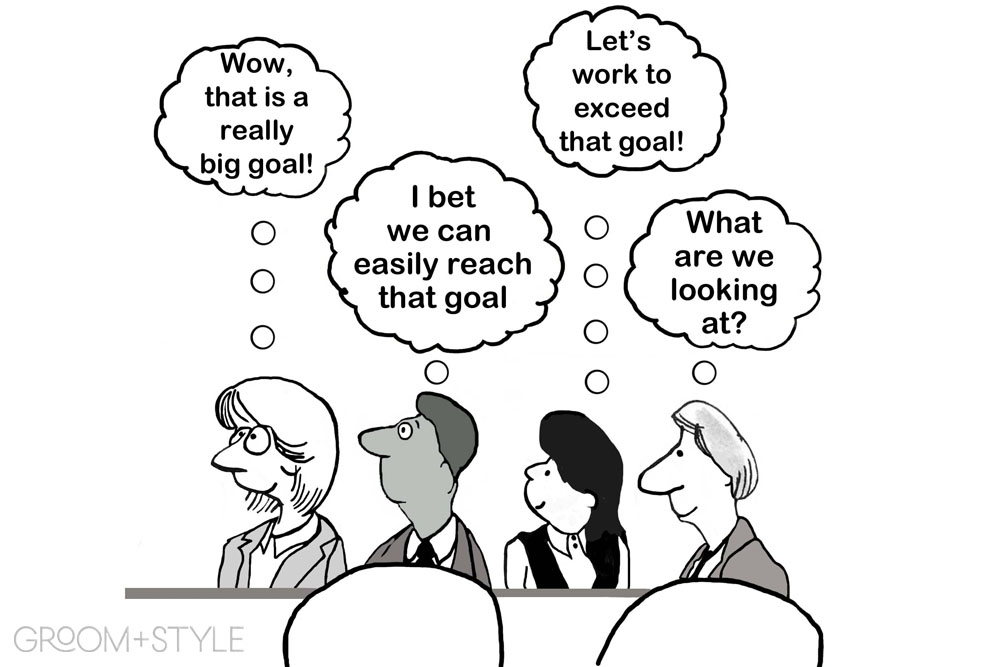
Just as not everyone reacts to stress in the same way, not everyone experiences stress from the same stimuli either. What may be stressful for one person could be comfortable for someone else.
Remember that stress is frequently based on how we experience changes. This means that consistent exposure to certain potentially stressful situations may allow us to become comfortable with that situation. It may also mean that some people feel acute stress to things that you are very comfortable with and vice versa.
Routine Stress
Routine stressors include work pressures, school, family life, and other daily responsibilities. These are the kinds of stressors that can sneak up on us and cause us to feel long term fatigue. We may feel that we are always running out of time or are overworked. Some of these daily stressors might be obvious when we examine our lives, such as being bullied or experiencing marital problems. Others, however, might be a little more innocuous, such as a busy schedule, concerns of personal identity, or dealing with learning new or difficult skills.
Sudden Changes
Sudden negative changes can bring on intense stress that can become the tipping point for someone who is already feeling under pressure. Some events that can cause sudden changes include losing a job, a divorce or separation, a death in the family, or suffering from an illness.
Work Stress

Work stress tops the list of stressors among adults. There are many factors about a work situation that can cause stress:
- Feeling unhappy with a job.
- Having a taxing job that requires a huge workload or assigns you more responsibility than you can handle.
- Being required to work excessive hours, either by managerial demand or unreasonable expectations.
- Working with poor management, or not understanding the expectations surrounding your work outcomes.
- Having little say in decision-making processes that affects you, your work, or your life, such as hours or shifts.
- Working in dangerous conditions.
- Being insecure about your opportunities for upward mobility.
- Having to perform in front of or among colleagues.
- Experiencing discrimination or harassment in an unsupportive work climate.
Sports-Related
Athletes frequently experience stress feeling the need to perform their best at their chosen sports. Sports-related stress is most frequently experienced by adolescent athletes and students. Sports stress can lead to high heart rates, anxiety, and poor performance during competitions.
In most cases, sports-related stress does not come from the act of exercising. Instead, this form of stress is prevalent in settings where an athlete’s performance is undergoing evaluation. Similar to workplace stress, extreme cases can be a sign of the negative impact of certain management or coaching strategies, unsupportive or stressful interpersonal relationships with teammates, bullying, or in the worst case, abuse.
Warning signs of sports-related stress include:
- A loss of appetite
- Inconsistent or disturbed sleep patterns
- Decreased performance or demotivation
In many cases, sports-related stress can be offset by strong teamwork and community building, the ability to recognize failure as a step toward developmental goals, tenacity, learning to respect others’ victory as well as your own, and taking pride in your accomplishments. Additionally, managing stress during competitions often means limiting the pressure exerted by outside forces, such as a coach, parents, or spouse.
How to Prevent Stress

It’s impossible to completely eliminate stress from your life. However, there are ways of limiting its negative effects on you and even increasing your resilience to stress. If you know that you’re going into a stressful situation, here are some ways to prevent it:
- Try to maintain a positive attitude that allows you to foresee positive outcomes for yourself and those you care about.
- Accept those things that are outside of your control. This will make it less likely that you will feel stressed about every little change in your life.
- Learn to be assertive as opposed to aggressive. Allow yourself to assert thoughts, opinions, or beliefs without becoming angry, defensive, or overly passive.
- Remain physically healthy with regular exercise and healthy, balanced meals. This can be aided by good meal prep and food storage.
- Learn the most effective time management methods for your own schedules and routines.
- Know your limits so that you can deliberately say ‘yes’ to things that you have time for and ‘no’ to those things that will bring more stress into your life.
- Set goals and priorities. We often feel self-imposed stress when expecting too much from ourselves. This can lead us to feel guilt or shame about our downtime as well. Goal setting can help you to understand the time you put into your activities and the importance and validity that this time holds. Additionally, prioritizing your goals is necessary to help you compartmentalize and so that you don’t feel overloaded by what you need to accomplish.
- Make time for your own hobbies and interests.
- Seek out social support and spend time with your friends and loved ones.
Stress Management

Stress management can help to decrease stress levels over time, improve reactions to stressful events, and decrease your risk of developing stress-related diseases.
Recognize the Signs of Stress
Different people will experience different reactions to stress. It’s up to you to recognize your own patterns and reactions. Don’t discount outside perspectives, however, since loved ones can help to point out our behaviors. Once you notice your stress escalating, you can start to intervene with relaxation.
Talk to a Healthcare Provider
Utilizing mental health care services can be a game-changer for minimizing the negative effects of stress in your life to get your life and career back on track. There is no shame in finding someone to talk to.
Every day of life means experiencing complex processes, many of which we have no control over. If you have frequent anxiety or stress from these or other experiences, it’s important to seek personalized strategies and outlets to help you manage that stress. If you have suicidal thoughts or feel that you cannot cope with the stress, or require the use of addictive substances to cope with your stress, it is imperative to see a mental health professional.
Mindfulness Meditation and Breathing Techniques
While long-term mindfulness meditation can increase individual resilience to stress, one of the best ways to manage that stress in the moment is through breathing techniques which help to calm and slow the heart rate and steady the mind after bursts of cortisol and adrenaline.
Maintain a Healthy Diet

Consuming a healthy diet can decrease the negative effects that you feel from stressors in your life. For many, this can be a difficult measure, since stress often triggers us to crave excesses of sugar, fats, and carbs. However, there are some meals that, rather than appeasing unhealthy cravings, actually help to elevate our mood and make us feel better by increasing our circulation and decreasing blood pressure.
Look for foods high in:
- Omega-3s – Found in salmon, tuna, and other fatty fish, and walnuts.
- Vitamin E – Found in sunflower seeds, almonds, spinach, and avocados.
- Polyphenols – Found in red wine, blueberries, and chocolate.
- Carotenoids – Found in leafy greens, green vegetables, and brightly colored peppers.
- Dietary Fiber – Found in oatmeal, nuts, beans, and raw fruit.
Cut Back on Caffeine
While caffeine can have many positive effects on your life, consuming too much of it or suffering from a caffeine addiction can exacerbate your anxiety. In addition to possibly throwing your sleep cycles into confusion if consumed after 2 p.m., caffeine affects your hormone balance:
- Adenosine – Caffeine can inhibit adenosine absorption, which is responsible for calming the body while allowing us to feel alert.
- Adrenaline – Caffeine pushes adrenaline straight into your system, which will give you a temporary boost, but may make you feel fatigued or depressed later on.
- Cortisol – Caffeine can increase the level of cortisol (the “stress hormone”) in the body.
- Dopamine – Caffeine increases the body’s dopamine level in the short term, but it can leave you feeling low after it wears off. Additionally, it can lead to being dependent on caffeine for dopamine.
Cut Back on Alcohol
While it may offer some temporary relief, alcohol’s psychological and physiological effects on the body compound upon stress and anxiety. Similar to caffeine, alcohol increases cortisol levels. Furthermore, when alcohol changes the hormone balance, it also inhibits it from returning to its initial balance (allostasis), so that the body sees the new stressful hormone levels as ‘normal’. Consuming more than two alcoholic drinks in a day will also interrupt sleep patterns among both heavy and occasional drinkers.
Strengthen Social Relationships
Your relationships with your friends, family, and professional contacts can all help to provide support, whether its practical or emotional. Seeking support from your community can help you to cope with difficult changes in your life as well as ongoing sources of stress.
Learn to Forgive
Forgiveness isn’t just a moral decision, it’s also a practical measure to improve mental health. In many cases, holding grudges means holding onto unnecessary stress, and forgiving others can offer powerful relaxation. We’re not just talking about forgiving your significant other after a fight, though that’s an important step as well, but also forgiving yourself for anything you might be holding onto.
Keep a Journal
Writing in a journal can help you relieve stress by offering a space to organize your thoughts and clear your mind. You might be able to get a clear view of what’s going on, how it affects you, and how you really feel about it. Additionally, journaling gives you a space to vent your frustration about sensitive matters without risking hurting anyone’s feelings.
Find Something That Makes You Laugh

Laughter offers physical effects that relieve stress, brighten the mood, release tension throughout the body, and promote strong overall health. An unforced, uncontrolled belly laugh can improve blood pressure and release endorphins.
Get In Touch With Your Creative Side
Some call it art therapy, others call it an outlet, but the point is a little creativity can go a long way to reducing your stress. The best thing is that you can be creative in whichever way you choose. This might be drawing, taking photographs, lettering, putting together mockups or models, crafting, playing a musical instrument, or whatever other hobby you can things off.
Relaxation Techniques for Stress Relief
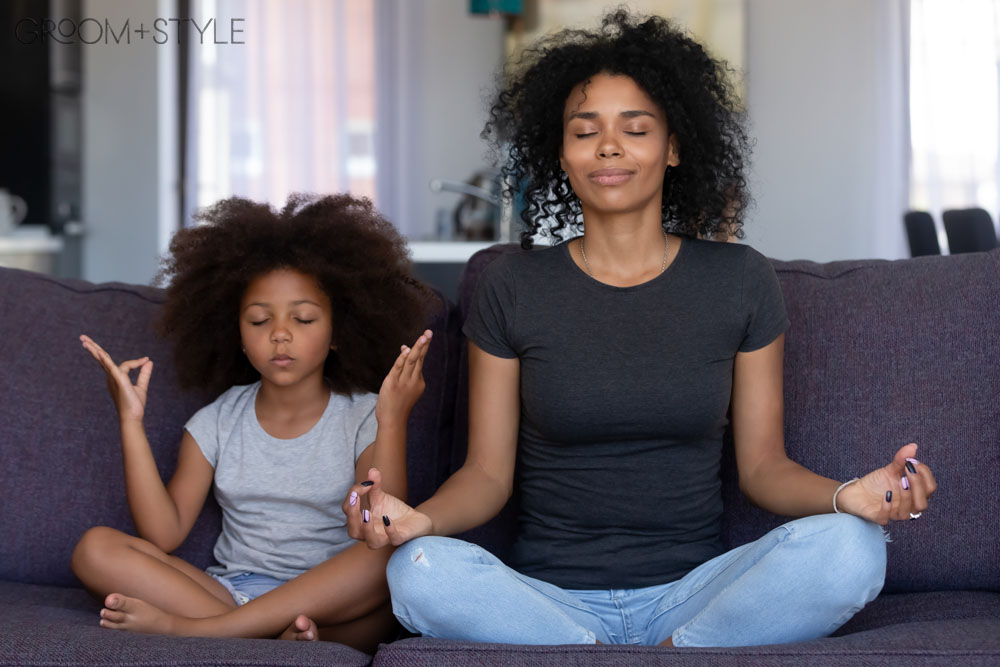
Relaxation techniques will often combine breathing, meditations, and positive or pleasant thinking to release tension from the mind and body. These routines work best if practiced regularly, so it can be very rewarding to schedule a time for them on a regular (weekly or bi-weekly) basis.
Meditation, Yoga, and Tai Chi are all relaxation and meditation techniques that allow the body to decompress from stress. These techniques each emphasize the individual ability to weather changes, to clear the mind of racing thoughts, and to stay in the moment.
Other examples of relaxation techniques include autogenic training, biofeedback, deep breathing, guided imagery, progressive relaxation, and self-hypnosis. Additionally, therapy with a mental health professional can help you develop techniques to manage stress, anger, anxiety, or depression.
Progressive Muscle Relaxation
Progressive muscle relaxation is a research-based relaxation technique that can help to relieve tension throughout your body and its various muscle groups. The process also clears the mind, allowing you to let go of daily anxiety.
The process refers to tensing up isolated muscle groups for five to ten seconds, and then releasing them for 30 seconds. As you work through the groups of your body, including your toes, thighs, glutes, back, arms, and face, it becomes easier to relax your body, steady your breathing, and let go of the stress.
One way to get started is to begin with the toes and slowly work your way up to your body. Continue the tensing and relaxing pattern until you’re done with all muscle groups.
If all else fails, a handheld massager is a godsend.
Top Guided Relaxation Videos
Using a video for guided relaxation and meditation can get you into the proper mode as you begin to meditate. Videos can strengthen your resolve while also walking you through the steps to achieve more from your meditation. It’s likely that using a guided video you can actually relax for longer amounts of time or more effectively than you might alone.
The Five Minute Miracle
Just five minutes of your time can help you think positively and mindfully. This meditation is great to fit in a quick and empowering relaxation session anytime anywhere.
Letting Go Meditation
This meditation helps lead you through letting go of stress and anxiety. It helps give a sense of lightness and encouragement so that you can go on to achieve your goals.
Guided Meditation for Forgiveness and Letting Go
Forgiving others and yourself can help to loosen the burden of self-imposed stress that many of us carry about in our lives. Additionally, learning to forgive others means opening up opportunities for more positive social interactions, all of which are good things for mental health.
Go to Sleep! Guided Meditation
This quick 10-minute meditation will get you sleeping in no time!
30 Minute Yin Yoga for Relaxation and Stress Relief
Yin yoga stretches and opens up the joints with long poses (each pose is held for up to ten minutes) and space for quiet as you relax into those poses.
Progressive Muscle Relaxation (Guided Video)
This is a physical and mental relaxation video that leads you through progressive muscle relaxation, which helps to release tension throughout the body while calming the mind.
A Step-By-Step Guide to Relaxing After a Long Work Day

- Clear Your Head Before You Walk Through the Door – Setting a positive environment in your home is an important part of being able to leave your stress behind at work. If you’re about to storm through your door and carry all your frustration home with you, take a pause before opening the door. Take a few deep breaths and get into a good headspace. Then walk calmly and deliberately into your home. Sometimes it’s good to leave yourself a reminder of this on your door until you establish a positive habit.
- Spend Some Time Outside – Take the dog for a walk, read while at the park, or settle into your patio furniture for an hour to decompress with some natural light and an expansive environment. Spending time in nature lowers stress levels by decreasing blood pressure, and it offers you a change of scenery from the usual indoors.
Don’t have the opportunity to go outside? Look out the window. Even looking outside at a green space can be helpful to your mental health.
- Get Comfy – Change out of your work clothes when you get home into something that allows you to relax, move and stretch a little, and be yourself. This could be your favorite pair of yoga pants or your comfiest sweatpants.
- Disconnect or Go Screen-Free – Your smartphone, email inbox, work computer, and other connections to work can hold you back from truly leaving your work stress behind. Not to mention, social media can be a source of interpersonal stress as well as work stress. Give yourself a chance to really relax after a long workday by setting aside your connections or go completely screen-free and let your eyes take a rest. Some people even create a man cave or she shed for this express purpose.
- Take a Warm Shower or Bath – If you’re the sort of person who stores their stress in muscle tension, then a warm soak can go a long way to relaxing your muscles. Follow the soak with a splash of cool water to re-energize. Take it a step further on an extra-long day by giving yourself a little spa treatment with bath salts or a face mask.
- Connect with Your Friends – Strong interpersonal relationships and laughter with your close friends or family can help to relax you and give you a space to talk about some of the more stressful things on your mind. If you’re feeling a lot of stress, it’s important to not also make choices that allow you to feel isolated as well.
- Plan Time for Something You Enjoy – On a busy schedule, it’s very difficult to get around to doing the things you like to do if you don’t plan for it. Make time for something you enjoy, whether it’s creating art, cooking or baking, reading, playing a level of your favorite game, gong for a local shopping trip, or even just watching a favorite movie. Maybe even try to create a space for these things such as a man cave or a she shed.
- Do Some Methodical Chores – Chores may not be the first thing on your list for stress relief, but there’s actually a lot of reasons to plan a chore into your evening to make yourself feel better. We often feel stressed when our homes are out of order or overly cluttered. Additionally, chores allow us to feel a large sense of accomplishment for getting something relatively small done, often mindless tasks.
- Have a Single Glass of Red Wine with Dinner – One glass of wine (5 ounces) before bed can help you to sleep soundly. Additionally drinking a single glass of red wine can improve blood pressure, blood sugar levels, cholesterol levels, and even body fat. But make sure to keep it limited to just one and drink it earlier in the evening if you want that good night’s sleep. Otherwise, too much wine can disrupt your REM cycles despite red wine’s initial melatonin boost.
Things to Keep at Home to Help With Stress

- An At-Home Massager – Many people store their stress as muscular tension in their neck and shoulders. Additionally, many of the ways we sit at a desk to work only exacerbate these posture and shoulder issues. Get yourself a quality neck massager for an easy at-home massage to banish stress tensions and keep mobility in your neck and shoulders. And while you’re stocking up on your at-home therapeutic massage kit, don’t underestimate the effect a good back scratcher can have on making you feel more comfortable, while also exfoliating you!
- A Stocked Tea Cabinet – Sipping on a hot cup of tea can offer relaxing calm and warmth in addition to any herbal benefits your favorite tea might provide. For example, those who drink five or more cups of green tea a day are less likely to show signs of psychological distress. In another study, tea drinking has shown signs of lowering post-stress cortisol. Also, make sure to have some decaffeinated or caffeine-free herbal teas to drink late in the evening, such as chamomile, lavender, or peppermint tea which will help to promote sound sleep rescue your circadian rhythm.
- A Quality Sound System – Whether you prefer a Bluetooth speaker for streaming music service or are more into vinyl collecting, having a quality sound system in your home can open up possibilities for relaxing and enjoying an evening.
- A Weighted Blanket – Weighted blankets apply pressure that can help to relieve anxiety while offering feelings of calmness. Some people even find that weighted blankets relieve insomnia due to their ability to decrease your mobility and restlessness. You can use it at night for extended use or even during an after-work nap.
- An Aromatherapy Dispenser – Research regarding the physiological results of aromatherapy is limited. One study found that lemon and citrus scents had a positive effect on mood and that lavender was able to decrease the level of the stress hormone back to pre-stress levels. However, we’re talking about relieving stress here, and if aromatherapy is something that you enjoy and use to relax you, then we say go for it!
- House Plants – We don’t always have the opportunity to go outside to nature when we need some stress relief. However, we can bring nature to us with indoor plants. Adding a potted plant to your home can give you some of the relaxation of spending time out in nature. Additionally, adding a potted plant or even artificial nature, such as silk plants, landscape photographs, or paintings, to your workspace can help you to feel less stressed and more attentive.
Exercise
Exercise is the stress-coping technique most frequently recommended by healthcare professionals. When exercising to combat stress, it’s important to keep your exercise regular and to stop short of exhausting yourself. Exhaustion may cause you to feel overwhelmed and unable to perform other activities that you have planned for yourself.
However, while many people may cope with stress by long gym visits of weight lifting or strength building, this is not always the best way to relax and exercise at the same time for everyone. Many coping with stress will frequently prefer cardio or yoga.
Exercise and Stress Relief
Although it takes time, regular exercise is a powerful way to battle stress. Just 30 minutes of exercise per day can boost your mood and reduce stress. This is because physical activity reduces cortisol to actually relieve symptoms of stress. Additionally, the endorphins that are released help your mind to relax and improve your mood.
Additionally, by increasing your blood circulation, exercise can help to decrease premature feelings of fatigue, giving you a little more time and energy in the late afternoon and evening for the things that you want to do.
While implementing exercise as a way to reduce symptoms of stress and anxiety, it’s worthwhile to consider body positivity as well. Even while we exercise, we can harbor ruthless negativity about our body and the things we intend to change about it. The way we feel in our bodies can be an intense source of stress, and just as you might think positively about your work skills as you proceed with your work goals, it’s important to remain positive about your appearance as you work toward your fitness and exercise goals.
Best Exercises to Relieve Stress
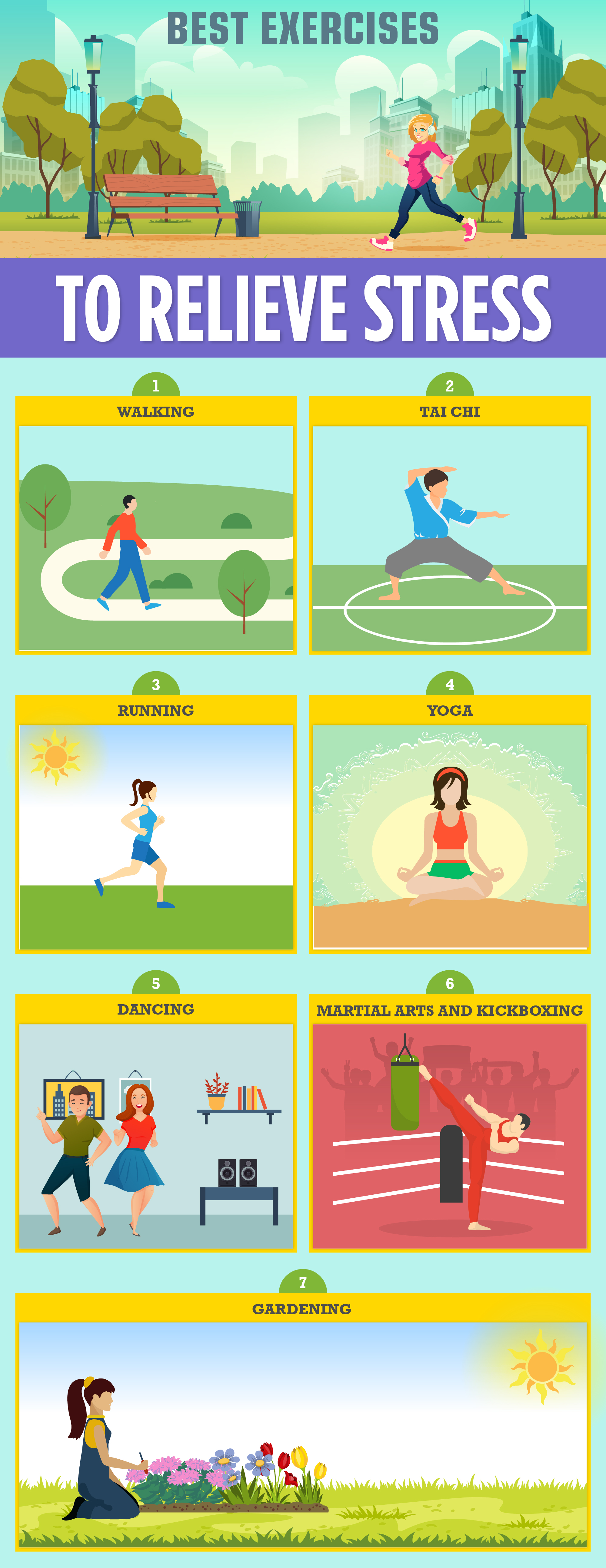
- Walking – The American Psychosomatic Society found that taking three 20-minute walks can have the same effect on the mood as taking an antidepressant.
- Tai Chi – This is a Chinese martial art. However, rather than being competitive, Tai Chi links physical movement with controlled breathing to improve muscular strength, mobility, and flexibility in a way that relieves pain, coupled with peace and serenity.
- Running – Running is one of the classic ways for high anxiety individuals to manage their stress on a daily basis. Runners can experience runner’s high, which is similar to a meditative state with controlled breathing. Many runners report feeling a sense of calm clarity.
- Yoga – As a mind-body exercise, yoga is perfectly suited to help you relax while developing physical strength and releasing tension.
- Dancing – Dancing is a fun, energetic, and creative outlet. Additionally, it requires music, which is a form of stress management all its own. Dancing helps to build confidence and a sense of self-expression that can combat feelings of anxiety.
- Martial Arts and Kickboxing – Sometimes stress comes from not having the proper outlet to state our feelings or vent our frustrations. These high energy activities not only burn calories and teach self-confidence, but they also create movements where you can vent your frustrations risk-free.
- Gardening – This might not be the first thing that comes to mind when you think of exercising, but gardening forces you to work with your hands, which burns calories, while bringing you closer to the ever therapeutic influence of nature. Additionally, growing and cultivating plants can work marvels on our mental health.
Best Stretches to Relieve Tension in Your Muscles
Stretching in your problem areas is an important way of relieving tension throughout your body. Tensions that go unaddressed can lead to worse problems, such as tight and strained muscles and reduced mobility. Instead, take time to slowly ease into some stretches, and remember to breathe as you do.
Tai Chi Twists – This is an incredible way to shake off sleep in the morning and wake up your spine after sitting for long hours.
Stand up straight with your arms at your sides. Start twisting your body, allowing your arms to swing slightly and naturally as you do. Start slowly, then the more you twist, the more you will warm up and open up your mobility so that you can twist deeper each time. After about forty seconds of twisting, come out of it by slowing down until your arms rest at your sides.
Upward Stretch and Forward Fold – Forward folds help to release all areas of the body in a satisfying way. You can do it once or in a flow.
Interlock your fingers and stretch upward, allowing your head to look upward and your hands. Then gradually fold downwards so that your hands reach toward the ground with your knees slightly bent to not feel any strain. Allow your body weight from your torso to pull you down into the stretch.
Spinal Twists – Spinal twists are amazing for relieving tension from the lower back and battling fatigue from long sessions of sitting.
Sit on the floor with one leg bent upright and the other leg against the floor beneath it. Twist your torso around emphasizing the lower back rather than the shoulders. Use the upright leg as a place to lock your arm as you twist. Then twist in the opposite direction. Switch legs to switch sides, and twist both ways again.
Shoulder Stretch – We store a lot of long term tension in our neck and shoulders. This often comes from bad posture, unnatural breathing practices, and feelings of stress and anxiety that tense up the way we hold ourselves in our shoulders.
Reach your arm in front of your body. Use the other arm to hook and lock it, then use the second arm to gently pull the first until you feel the stretch in your shoulder. Switch sides.
Bend your arm behind your head with your elbow raised upward to the sky, and your hand falling back down to the back of your neck. Then, use the other hand to pull your elbows and bring it into a shoulder stretch. You should feel this in your shoulder and the outer part of your arm, but it should not hurt your neck. Count to twenty, then switch sides.
Sleep to Reduce Stress

When your body sleeps it recovers from stressful events. This means that restless nights will only exacerbate the stress that you feel. Seven to eight hours of sleep a night can help to promote longevity while improving the appetite, immune system function, and memory. Additionally, sleep relaxes the body and rest allows us to have sharpened mental acuity that increases our ability to cope with events that would cause stress.
Some techniques to help you get better sleep and reduce stress include scheduling your sleep, avoiding stimulants late at night which can be anything from caffeine and nicotine, to blue light.
It’s also important to make your bed comfortable for you to be able to sleep. There are a number of mattresses on the market that can provide a cooling effect for better sleep. Memory foam mattresses can conform to the body’s shape and curves to provide support for optimal relaxation. Don’t forget that the pillow matters, particularly for back sleepers, as it offers support to the neck for relaxation and rest.
Conclusion
While we can track the science as much as we want, stress is a big catch-all for describing our physiological and psychological responses to certain events. We all experience stress for different things, and we all need to find the right way for us to deal with that stress.
There are many options for managing stress that are both scientifically tested and can work into your personal lifestyle and choices. The key is to pay attention to your own stress cues and find the management techniques that help you to improve your life.


